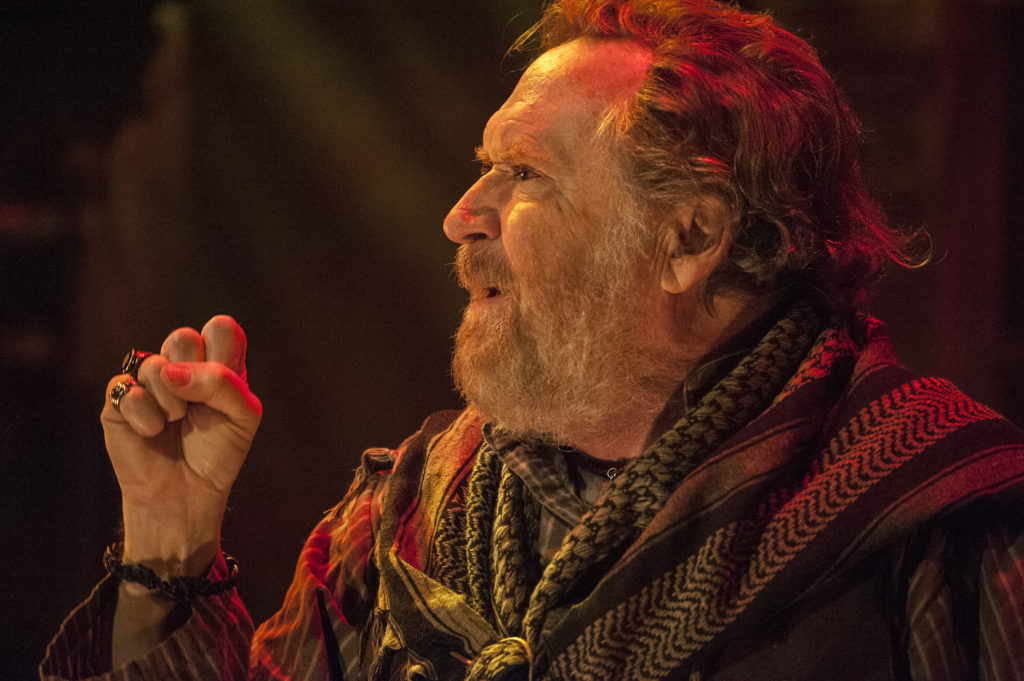
By Juliet Wittman (Read the original.)
An Iliad: A One-Person Epic About War and Bloodlust
An Iliad is a version of Homer’s epic poem about the Trojan War, told in ninety minutes in a mixture of exalted language and everyday vernacular by a single lonely figure on a stage that represents somewhere blasted and unnamed — a place with dark, broken windows, bits of crumbling brick wall, an overturned trash can.
In the Boulder Ensemble Theatre Company’s fine local premiere, that lonely weather-worn figure — The Poet — is actor Chris Kendall, and there’s only one weekend left to see his performance. He is tasked, Kendall says, with telling the story of the Trojan War: “Every time I sing this song, I hope it’s the last time,” he adds. But of course it won’t be, because, as the recitation makes clear, war has been a constant throughout recorded history. At one point The Poet gives a long but still incomplete list of conflicts, famous and obscure, from ancient times to the present — including the nineteenth-century Pastry Wars, when France invaded Mexico.
It’s because the United States has now been at war in the Middle East for so long that authors Lisa Peterson, an acclaimed director, and Denis O’Hare, known for his work on the television shows True Blood and American Horror Story, were inspired to write An Iliad. The work is insightful and deft. There are times when it evokes the full majesty of the original poem, others when The Poet simply chats with us or reveals his own overpowering sorrow and fatigue. And, like The Iliad itself, the play tells a cracking good story.
The Poet swiftly provides some context, referring to beautiful Helen, whose abduction caused all the bloodshed to begin with, reminding us toward the end of the famed Trojan Horse — but for the most part, he focuses on just a few weeks of the ten-year conflict and a handful of key characters and events. The result is blood-engorged and exciting, interspersed with moments of genuine pathos and humanity.
There’s a kind of contradiction at the heart of this endeavor that both vitiates and, in an odd way, strengthens it. Peterson clearly intended a work that illustrates the terrible futility of war — exemplified by the dishonest pretexts on which America went to war in the Middle East in the first place and the ugly and chaotic consequences, not only for the people of Iraq and Afghanistan, but for thousands of others in the region.
The primary reason The Poet seems to offer for human bloodthirstiness is a kind of innate rage, something in our very DNA. Perhaps this is demonstrated by our enjoyment of his gore-filled descriptions, not to mention current film and television offerings. But I’m not sure it entirely works as an explanation. The story in An Iliad is of great warriors and their high-born, long-suffering women. There’s nothing much about civilian lives torn apart by war, though there is a nod to the regular soldiers — the anonymous farm boys and working kids from small towns and big cities all over America destined to fight and die at the whim of their rulers.
Still, An Iliad does succeed in bringing home the full horror of war through the voice, body and presence of The Poet, and Kendall is simply wonderful in the role, attaining heights of grandeur when required, creating sheer excitement in the descriptions of combat, embodying each character — large or small — with deep empathy and humanity and, during the interstices of his story, communicating a bone-deep weariness and profound longing for peace.
